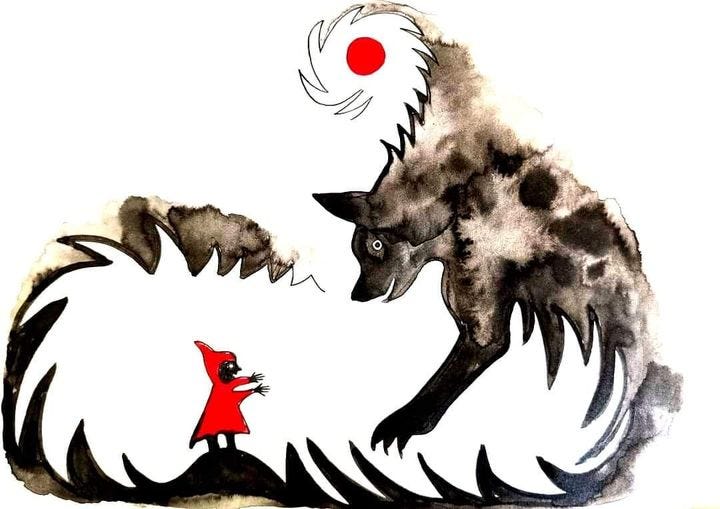Public domain image of Pipi Longstocking
When I first started studying astrology (in the summer of 2015) I was a bit disappointed to learn that Pisces, my sun sign, is a mutable sign. I had wanted to be born in a cardinal sign, the sign of fearless go-getters!
Astrology divides Zodiac signs into three groups: cardinal, mutable and fixed (also known as modalities or triplicities). Our modality is directly related to our way of being in the world, our “energy signature”.
Cardinal signs are the trendsetters, the shakers and movers, the people behind a “start-up”. Fixed signs keep going and don’t give up. They have “stickability” (as I heard the mother of a young boy once call this quality). Mutable signs excel at adapting, going with the flow, rolling with major changes or making helpful tweaks, which make all the difference between an idea failing or succeeding.
There is (of course) far more than this going on in a natal chart, as it displays (or maps) a highly complex constellation of forces and influences. Being born exactly on the cusp between Pisces and Aries might just make me a little stubborn and strongminded! As I grow older and (a little) wiser I have come to appreciate the mutable dimension of my personality. I can flow with unexpected twists and and “flip the pancake” to find gifts in disappointments and blessings in setbacks.
The same thing is true for insults and compliments. If we work with the mutable part of ourselves (but doing this is counter-intuitive to fixed signs and cardinal signs would probably not have the patience for it!) we discover that every insult holds the kernel of a compliment.
About 12 years ago I attended a spiritual course where another participant snapped at me: “You are Pippi Longstocking, aren’t you? You will never grow up!” Pippi Långstrump, as she is called in Swedish, is a character from Swedish books for children written by Astrid Lindgren. This series also became a very successful TV series and the stories were translated into many foreign languages.
Pippi is red-haired, freckled, unconventional and superhumanly strong – able to lift her horse one-handed. She is playful and unpredictable. She often makes fun of unreasonable adults, especially if they are pompous and condescending. Her anger comes out in extreme cases, such as when a man mistreats his horse. Pippi, like Peter Pan, does not want to grow up. She is the daughter of a buccaneer captain and has adventure stories to tell about that, too. Her four best friends are her horse and monkey, and the neighbours' children, Tommy and Annika. Source
So this particular example was easy for me! I immediately heard her comment as a big compliment, which made the person picking on me even more annoyed . I have no difficulties “owning” that my inner child looms large in all I do. That I play freely and openly. Also that I see magic and miracles everywhere and name them, even in the presence of “non-believers”.
Of course this is MUCH harder to do this with most insults. In January I enjoyed a period of profound solitude alone here in our forest house (in arctic weather conditions). One theme that floated up quite soon, after not seeing any human beings for only three weeks, was the question (reconnecting to the world and output of fellow humans): “Is this your craziness, my craziness or collective craziness?” I had (inadvertently) detoxed from other people’s opinions of me and dominant cultural narratives!
In contemporary Western culture people can be awarded a PhD without ever being asked to reflect on how they project their own unwanted shadow material onto others. On a podcast I recently heard about one case where a woman got her PhD in psychology based on her own diaries and musings about her gender fluidity: a case study of one (if we now scientifically can count ourselves and our own journals as a proper case study, this seems highly questionable to me).
People project like crazy, all day long! If you don’t believe me, have a look at X - formerly called Twitter - or the comments on reels posted on social media. Those people are adamant that others are “wrong” or “bad” individuals (or parents) and don’t mince their words, hiding behind “internet anonymity”. Here I am not talking about convicted criminals or diagnosed psychopaths. I am talking about “regular decent people”, everyday citizens who (probably) slog away at the coalface of their profession, do the shopping for their elderly neighbours and adopt rescue animals.
Here are some things that people have said to me that did hurt:
That I should never have children because I am so weird that it is genetically too risky (for the record: I have three gorgeous and talented Viking sons!)
That I am the worst teacher that ever lived and that I don’t know what I am doing (that single comment, by a student who refused to do any shadow work, is balanced by wonderful testimonials from students rolling in every single day of my life and invitations to teach or present arriving from all over the world).
That I have wasted my entire life on “things that do not exist” (meaning seeking and sharing spiritual wisdom)
Of course those three scenarios all have a flipside:
My three sons are the best “thing” that ever happened to me. I am strong enough to not let a family member talk me out of" “living my greatest dream”.
Students habitually project their parental figures, childhood experiences and experiences with authority figures onto teachers. I cannot be in the profession I have if I cannot handle such comments and see them for what they are (projections or outsourcing of personal trauma).
Many things in life are not material or easily quantifiable: think of love, friendship, loyalty, generosity of spirit, the precious wisdom of young children and dying people. I see it as a sacred task to inject spiritual perspectives into our commercial, consumerist and capitalist world. The fact that I am constantly turning down paid work and making referrals indicates that there is (at least some) need for what I do.
In my family of origin I was the scapegoat (see: THE SCAPEGOAT). A systemic configuration like that leads to a severe loss of self-esteem and being bullied in school (because others read the energy signature that was branded into you, at a tender age, and interact on the same frequency). This is a tough fate!
At a young age I learned to flip that pancake as well: it forced me to take a step back and develop my capacity for independent and critical thinking. It made me rely on myself (way too much admittedly) and develop a strong and supportive relationship with myself.
What I also discovered, at young age, is that (well-founded) criticism is a gift, because it provides valuable pointers to how we can improve.
Disproportionate and horribly worded criticism is generally not a reflection on us, it tells us everything about the mindset and unresolved issues of the other person.
If we can learn to hear criticism and evaluate it correctly (without fighting, fleeing, fawning or self-flagellation) we can grow, improve our communication skills and tweak the impression we make on others.
Some examples of useful criticism I have received are:
- That I “talk with my hands”. I need to make a conscious effort to keep my hands still (or off-screen) when I give a lecture or teach a class.
- That my voice can flip into a high register and sound too shrill, when I am under pressure. I need to make a conscious effort to speak in a lower octave, when I address a large group.
- That I dismiss any compliments I receive by contradicting them or ignoring them. I now actively work on receiving and acknowledging the positive things people say to me.
It stands to reason that if you constantly receive excessive criticism in childhood, and are blamed for things completely outside your control for two formative decades, that you learn to shield yourself (to some extent) from both negative and positive feedback. And I know (from reactions to that previous essay, THE SCAPEGOAT) that I was far from alone in experiencing this! Groups (including family systems) LOVE dumping their unwanted and disowned shadow material on scapegoats).
So anyway, next time someone says something nasty that takes your breath away (ideally someone you know in person, not a troll on social media!) take some time out and ask yourself:
Are they truly saying anything about me or are they publicly displaying their own ignorance, vulnerabilities, obsessions and distortions in their awareness?
Is there is a kernel a truth in what they say, and if so what is the compliment hidden in that kernel?
For instance
That they consider me brave enough to even listen to criticism?
That they are taking me down a few pegs because they are jealous of my achievements or afraid of me being in my power?
Do I actually feel sorry for them because they are clearly unhinged and drowning in unresolved issues?
Do they sound just like my parents or siblings and I learned long ago that I don’t need to take those messages to heart?
Whatever it may be, give yourself a pat on the back. You listened. You kept your cool. You learned something without being horrible to yourself!
Most people who indulge in such lavish criticism are not at all willing to listen to criticism in return – they prefer to deny, sulk and then ride off into the sunset on their high horse.
As a lifelong observer of these dynamics, I can reassure you that most people are extremely busy making fools of themselves, even making a blatant display of themselves, in the things they say about “other people”. See right through them and have a good laugh!
Mirror, mirror on the wall, who lacks the most self-awareness of them all?!
Last but not least, thank you for reading and entertaining this idea, even just for five minutes!
I try (but sometimes fail) to get out at least one essay a week (sometimes more), due to travel, international teaching commitments and family care responsibilities (our family lives with Alzheimer’s and I have written several posts about that). If you would like to see regular posts about about Nordic spirituality and my life as a Forest Witch (and of course short videos of all the wildlife here!), please follow me on Instagram or Facebook, thank you! All artwork and photographs shared in my posts are my own, unless explicitly credited to a different source.
Imelda Almqvist, Forest Witch, Sweden
BIO FOR IMELDA ALMQVIST
Imelda Almqvist is an international teacher of Sacred Art and Seiðr/Old Norse Traditions (the ancestral wisdom teachings of Northern Europe). So far she has written four non-fiction books and two picture books for children. Natural Born Shamans: A Spiritual Toolkit for Life (Using shamanism creatively with young people of all ages) in 2016, Sacred Art: A Hollow Bone for Spirit (Where Art Meets Shamanism) in 2019, Medicine of the Imagination - Dwelling in Possibility (an impassioned plea for fearless imagination) in 2020 and North Sea Water In My Veins (The Pre-Christian spirituality of the Low Countries) was published in June 2022.
The Green Bear is a series of picture book for children, aged 3 – 8 years. The stories and vibrant artwork, set in Scandinavia, invite children to explore enchanting parallel worlds and to keep their sense of magic alive as they grow up.
Imelda has presented her work on both The Shift Network and Sounds True. She appears in a TV program, titled Ice Age Shaman, made for the Smithsonian Museum, in the series Mystic Britain, talking about Mesolithic arctic deer shamanism.
Imelda currently has a handbook for rune magicians (about the runes of the Elder Futhark) in production (it will be published by Moon Books in 2026). She is now working on a book about Inuit deities and mythology. Imelda runs an on-line school called Pregnant Hag Teachings, where all classes she teaches remain available as recordings, which can be watched any time.
Website:
http://www.shaman-healer-painter.co.uk/
YouTube Channel: youtube.com/user/imeldaalmqvist
Online School: https://pregnant-hag-teachings.teachable.com/courses/
Facebook: https://www.facebook.com/imelda.almqvist/
Instagram: https://www.instagram.com/almqvistimelda/







Others read the energy signature that was branded into you.”
I love your essays, Imelda, and quite often turn them over and have conversations with them in my head. I'm moved to respond more directly now as a fellow hand-talker! I'm sorry that you've been criticised for talking with your hands. It's something that I too tried to suppress for years until I realised that when I'm teaching, paying attention to the movements and shapes that my hands are making quite often helps me to understand, to crystallise, to articulate what it actually is that I'm trying to say! They are reaching and taking something immaterial, intangible, and translating it into the body for me so that I can better express it. Now - making sure that I'm sitting far enough from the computer's camera that it's not being obscured - I let them fly. And "shrill"? The misogyny in that... What about piercing, urgent, able to cut through, to rise above the bombast or confusion or agitation, to quite literally raise the vibration? ;-)
Thank you, again, for all of your practice that you so generously share with us.